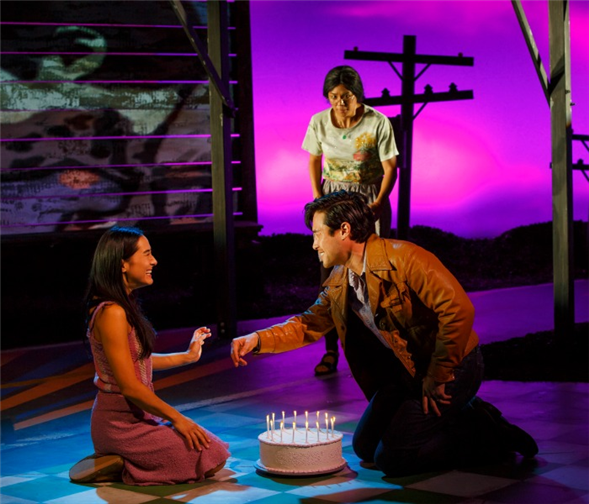Translate Page

Playwright Qui Nguyen explains why one exchange in Vietgone inspires radically different reactions
---
At the very end of Vietgone -- Qui Nguyen's sex- and profanity-packed dramedy about how his parents met in an Arkansas refugee camp after the fall of Saigon -- the father, Quang (Raymond Lee), gets incredibly angry at his playwright son (Paco Tolson). When his kid parrots the generally accepted consensus that the U.S.'s involvement in Vietnam was "one of the biggest military mistakes in all of history," Quang counters, "Son, I love you. You very smart, but sometimes when you talk, you sound stupid like shit." A former helicopter pilot for the South Vietnam Air Force who fought alongside American troops, Quang refuses to reduce the war to a talking point. As he so poignantly explains, "To Vietnamese, the war was not political, it was real…We fight because it was only thing we could do. But we not choose to be in war. War came to us."
For many in the audience at Manhattan Theatre Club's Off-Broadway house -- where the show is currently in previews -- this may be a fresh and thought-provoking perspective on that terrible conflict, one devoid of cut-and-dry allies and enemies, victors and victims. And yet this incredibly affecting moment wasn't initially in the show at all.
"I wrote that scene outside of Vietgone a long time ago," Nguyen says. "The only reason it's attached to my play is that my original page count was so short, I didn't want South Coast Rep [the California-based theatre company that commissioned the piece] to think I was lazy! So I was like, 'We flash forward years later!' I know, 'Cheater, cheater.'"
While Nguyen understands why lots of people are drawn to that scene, he says that for Vietnamese viewers, it plays differently. "I remember talking to a bunch of Vietnamese kids at University of California, Irvine who saw the show, and they were like, 'Oh, that's so my dad! That's the way he talks about the war,'" Nguyen says. "For us it's like the most redundant, boring-ass speech ever. Meanwhile, white people are like, 'That was so moving!'"
It's just one example of how Vietgone satisfies diverse audiences in different ways. Fans of Nguyen's "geek theatre" shows with his company Vampire Cowboys will relish the ninja battles, comic book-style projections, and gleefully anachronistic rap songs performed by the characters. Meanwhile, those who prefer traditional narratives should get hooked by the romance between Quang and Tong (Jennifer Ikeda), who share a fierce attraction and the devastating bond of having left their country and loved ones behind.
{Image1}
Although the conflict in Vietnam permeates the story, as the playwright character states at the outset: "This is not a story about war -- it's a story about falling in love." Creating a pair of hot, multifaceted Vietnamese characters was Nguyen's main goal. "I wanted to draw sexy Asians," Nguyen says. "If you took Asian relationships from how the media portrays them, women are all hookers or virgins, and couples are loveless and dry and have no complexity. It's all this one-dimensional shit. I want to show something that's truthful to the people that I know as my parents, as three-dimensional as any race. You don't see that very often. It feels really special to a population that's totally underserved. That's why those first 90 minutes mean more to me than those last 10," when a modern-day Quang lectures his grown son about the war.
Nguyen interviewed his parents extensively as fodder for Vietgone, though initially he didn't reveal that the play was specifically about them. "For the longest time my parents thought it was just general research," he says. "I'd ask about things like martial arts or how a helicopter works. I would ask them dumb questions all the time. They didn't realize I was going to write a show about them. They would have thought it was presumptuous. They don't think their lives are interesting! They figure there are a thousand refugee stories, what makes theirs so special?"
In Nguyen's eyes, a lot. His conversations with them were so rich and expansive that Vietgone turned out to be the first in what will eventually be a five-play cycle about his family. Considering all of the unanswered questions at the end of the show -- like what happened to Tong's brother and Quang's first wife and kids -- audiences should be relieved to hear they will be addressed in future installments. "I am very aware I left those stories open-ended; they're there on purpose," Nguyen explains. "The plays are basically like five points in my parents' love story. Harder stuff happens. In the third one my mom loses a brother. The next one is my grandmother passing away. It's complex."
Because of the current refugee crisis, Vietgone feels depressingly timely. And even though Nguyen didn't have that in mind when he started writing the play a few years ago, it's impossible not to make the connection now. "When you see stories about people coming here, it's usually not from the perspective of losing something," he says. "It's mice coming to American and saying, 'I've always wanted to be here!' My parents weren't coming to chase opportunities, they were running away from being killed, but their hearts were back in Vietnam. And of course now that the show's being produced at this point, it's really important. With all these people supporting Trump and demonizing refugees…dude, I hate the demonization of refugees! Whether it's Vietnamese or Hmong or Syrian or whoever else, I want to remind people that every refugee out there is a person."
---
Follow Raven Snook at @RavenSnook. Follow TDF at @TDFNYC.
Photos by Carol Rosegg. Top image: Jennifer Ikeda, Samantha Quan, and Raymond Lee.
TDF MEMBERS: Browse our discounted tickets to theatre, dance, and concerts.